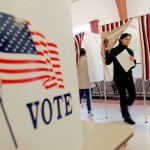Big Primary Turnout Shows Energized Republican Base
 One factor united primary races across the country: the higher turnout and voter enthusiasm evident on the Republican side.
One factor united primary races across the country: the higher turnout and voter enthusiasm evident on the Republican side.
The smoke is still clearing in the New Hampshire primary (really, you’d think one thing New Hampshirites would know how to do is count votes) but some of the outlines of last night’s primary election results are clear enough to comment on:
- Sarah Palin may not own conservative politics in America but she does hold the lease through November and probably beyond. In race after race where base turnout is all that mattered, her endorsed candidates have won and mostly seem to be holding up just fine. Since the base Republican vote will remain of paramount importance in the low-turnout mid-terms, most GOP candidates in most places will be begging for her support. After the elections, Republican leaders in Congress may be placing a lot of calls to Wasilla to solicit Palin’s views on the specifics of legislation rather than just election endorsements.
- There is something a little too pat about the consensus that Christine O’Donnell is unelectable. The depth of Republican anger and independent alienation over the economy and health reform has pushed us into electoral terra incognita. Even candidates like O’Donnell who seem fundamentally out of alignment with their states deserve the benefit of the doubt as the general election campaign begins. Back in August, we were told that Lisa Murkowski had not done what was “necessary” to “define” her opponent and therefore lost. Mike Castle paid attention to that lesson and “defined” away. Christine O’Donnell still won. Could it be with the public so turned off to incumbents that our mental models for how politics is supposed to work are out the window?
- If the pundits are right and O’Donnell can’t win in the general, the Republican path to a Senate majority just got a lot tougher as it would require wins in places like Oregon and New York. Things are bad for Democrats this year. But are they that bad? And, if Republicans are just short of a majority, are they in better political position than having nominal control of, and responsibility for, the fiscal train wreck that is just around the corner? Also, bear in mind Democrats are facing a very tough year in 2012 defending 21 seats to the GOP’s 9. The mix of seats isn’t encouraging either. Democrats will have incumbents up in places like Florida, Michigan, Missouri, Nebraska, North Dakota, Montana and Virginia while Republicans are mostly concentrated in solidly Republican states.
- The New Hampshire results (if they are ever tabulated) may turn out to be a model of success for Republican coalition management. As of this writing, Kelly Ayotte (the Palin-endorsed, establishment Republican) has a lead of just under 1,000 votes over conservative favorite Ovide Lamontagne. If she holds on and wins, Republicans will have chosen candidates for the Senate seat and both House races (former Congressman Charlie Bass and former Manchester Mayor Frank Guinta) who are close to perfect fits in their districts and avoided the rancor that has been such a notable part of GOP primaries elsewhere.
- Republican turnout numbers continue to be impressive. In Delaware, the O’Donnell-Castle match-up drew almost 60,000 voters compared to 33,000 for contested statewide races on the Democratic side. The Delaware Secretary of State reports that Republican turnout was 32 percent compared to just 12 percent among Democrats. In New Hampshire, where independents can vote in primaries, Republican turnout in the Democratic-leaning 2nd District was 55,000 compared to just 31,000 for the contested primary on the other side.
- Scott Walker, Milwaukee County Executive and one of the bright, young GOP stars from the Midwest, thrashed former Congressman Mark Neumann in the Republican gubernatorial primary. Walker, who is able to navigate the populist-conservative line in Wisconsin with great skill, will be a very strong contender in the general against Tom Barrett. The combined GOP primary vote in the Republican gubernatorial race was over 613,000 votes compared to 232,000 for the Democratic candidates. The Republican nominee for U.S. Senate, Ron Johnson, drew over 500,000 votes against weak opponents. Russ Feingold must be very interested in those numbers.